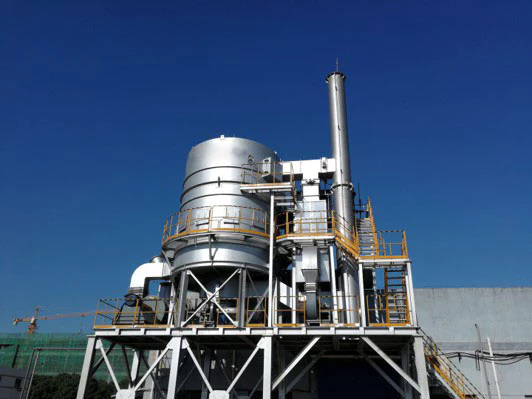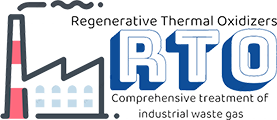Regenerative Thermal Oxidizer in Chemical Industry
pengenalan
The Pengoksida Terma Penjanaan Semula (RTO) is a crucial component in the chemical industry, playing a vital role in environmental protection and air pollution control. This advanced technology effectively reduces harmful emissions and ensures compliance with stringent regulations. In this article, we will explore the various aspects of the Regenerative Thermal Oxidizer in the chemical industry and delve into its significance.
Working Principle of RTO
– The RTO operates on the principle of thermal oxidation, which involves the combustion of volatile organic compounds (VOCs) and hazardous air pollutants (HAPs).
– It utilizes a regenerative chamber system that consists of ceramic beds filled with heat transfer media, typically ceramic saddles or structured ceramic blocks.
– The contaminated air is introduced into one chamber while being preheated by the outgoing exhaust gases from another chamber.
– As the temperature increases, the VOCs and HAPs present in the air stream are oxidized into carbon dioxide and water vapor.
– This purified air is then released into the atmosphere, meeting the required emission standards.
Benefits of Using RTO
– High Efficiency: RTOs are known for their exceptional thermal efficiency, often exceeding 95%. This ensures a minimal energy footprint and reduces operating costs for chemical industry facilities.
– Cost Savings: The regenerative process allows for the recovery of a significant amount of heat generated during oxidation. This heat can be utilized to preheat the incoming air, resulting in substantial energy savings.
– Environmental Compliance: By effectively removing VOCs and HAPs, RTOs assist chemical industry facilities in complying with stringent air quality regulations. This helps protect the environment and ensures the health and safety of the surrounding communities.
– Versatility: RTOs can handle a wide range of pollutant concentrations and flow rates, making them suitable for various chemical industry processes. They can effectively treat exhaust streams with low to high VOC concentrations.
– Longevity and Reliability: RTOs are designed to withstand the harsh operating conditions of the chemical industry. With proper maintenance and periodic inspections, these systems can provide reliable performance for many years.
Aplikasi RTO
RTOs find extensive use in the chemical industry across different applications. Some notable ones include:
– Petrochemical Plants: RTOs are employed to control emissions from processes such as solvent recovery, storage tank venting, and wastewater treatment.
– Pharmaceutical Industry: RTOs effectively treat exhaust streams from pharmaceutical manufacturing processes, ensuring compliance with stringent regulations and maintaining air quality standards.
– Paint and Coating Operations: RTOs play a crucial role in controlling emissions from paint booths, curing ovens, and other coating processes, helping to minimize environmental impact.
– Chemical Manufacturing: RTOs are widely utilized in various chemical manufacturing processes, including polymer production, chemical synthesis, and specialty chemical production.
Kesimpulan
The Regenerative Thermal Oxidizer (RTO) serves as a vital tool in the chemical industry, enabling the effective control of emissions and ensuring environmental compliance. With its high efficiency and versatility, the RTO has become an indispensable component for chemical industry facilities. By utilizing this advanced technology, the industry can continue to thrive while minimizing its impact on the environment.

Regenerative Thermal Oxidizer in Chemical Industry
Our company is a high-end equipment manufacturing and new technology enterprise that focuses on comprehensive treatment of volatile organic compounds (VOCs) and carbon reduction and energy-saving technologies. We specialize in the production of regenerative thermal oxidizers (RTOs) and molecular sieve rotary concentrators, and combine our expertise in environmental protection and thermal energy system engineering to provide customers with integrated solutions for industrial waste gas treatment and carbon reduction.
Our core technologies include thermal energy, combustion, sealing, and automatic control, and we have the ability to simulate temperature fields and air flow fields, model calculations, and conduct experimental tests on ceramic heat storage materials, molecular sieve adsorbents, and high-temperature incineration and oxidation of VOCs.
We have a team of more than 360 employees, including more than 60 R&D technology backbones, three research professor-level senior engineers, six senior engineers, and 28 thermodynamic doctors. Our core technology team comes from the Sixth Academy of Aerospace Liquid Rocket Engine Research Institute (Sixth Academy of Aerospace Liquid Rocket Engine Research Institute). We have set up an R&D center for RTO technology and a waste gas carbon reduction engineering technology center in Xi’an and a production base of 30,000 square meters in Yangling.
We have obtained various certifications and qualifications, such as intellectual property management system certification, quality management system certification, environmental management system certification, construction industry enterprise qualification, high-tech enterprise, and patents for RTO rotary valve, rotor-type heat storage incineration equipment, and disk-type molecular sieve rotary concentrator.

How to Choose the Suitable RTO Equipment
- Gas Volume and Concentration
- Thermal Efficiency
- Operating Costs
- Equipment Reliability and Safety
- Environmental Protection Standards
When choosing RTO equipment, it’s important to consider the gas volume and concentration to ensure the equipment can handle the specific type and amount of waste gas. The thermal efficiency of the equipment should also be taken into account to make sure the energy consumption is reasonable. Additionally, operating costs, equipment reliability and safety, and compliance with environmental protection standards should all be considered to select the most suitable RTO equipment.

Proses Perkhidmatan Kami
- Consultation and Evaluation
- Design and Program Development
- Production and Manufacturing
- Installation and Commissioning
- After-sales Support
We provide a one-stop solution with a professional team to tailor RTO solutions for customers. Our service process includes consultation and evaluation, design and program development, production and manufacturing, installation and commissioning, and after-sales support. We provide customized production, quality control, and factory testing for each customer to ensure optimum performance of the equipment.
